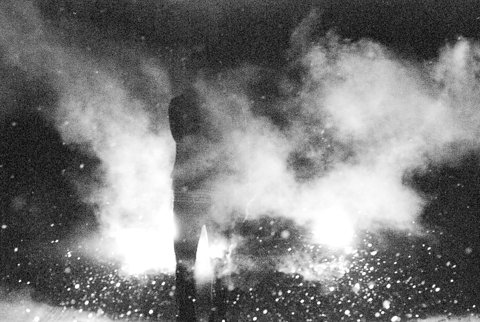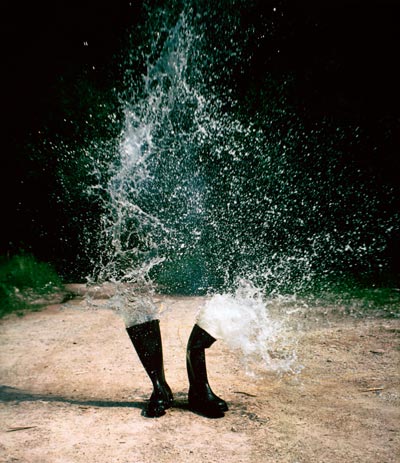Chase: You told me a story recently about your newly positive friend Jean-Francois. If I remember correctly, he linked being positive to a sense of authenticity. He made reference to a line of other positive people whom he admired (Derek Jarmon, Marlon Riggs, Jack Smith). He named a sense of belonging to social and political narratives of struggle and otherness through positive(ity). You wondered out loud to me: “Why not practice safer sex?” Your face said more than your words. Gesturing to me that there was more in there, different definitions of the positive side… And perhaps newly revised definitions of the negative side, whatever that might mean. I wonder how that makes you feel?
Mike: Your question is already an answer I can’t face, particularly the part about what my face was saying that my words couldn’t manage. Perhaps these words are a cover story for what my face longs to show, and what we continue to demonstrate to each other without realizing it. I mean simply: that I’m showing you something that I can face only when it shows up on your face. I can see certain parts of me only when you’re giving them back to me. When we speak together, some of what I can’t bear to say is showing up on my face, and I’m asking you to hold that, so that I can bring it back inside as something recognizable. If you hold it and make it OK, then you give me the chance to make it OK too. Does that make any sense? This question of what I can face, or what I can bear, and what I can only face with you, when we are together, feels central to the experience of being positive.
What your question so helpfully reminds me, for instance, is how negative I feel about being positive. Or at least: it’s a gift I don’t want to share. When Jean-Francois told me he was positive, I felt an enormous sadness (that he didn’t feel!) coupled with a peculiar sense of personal responsibility and failure. As if anything I might have done or said would have made a jot of difference. I felt something similar at a day-long AIDS gabfest at Concordia University. It had been organized by unthinkably young students who spoke so beautifully and powerfully about their bravura organizings and remapped intimate encounters. They had turned their wounds into new sites of vulnerability and social action. It was, as the kids like to say, awesome. But at the same I felt myself shrinking in the chair. To sit in a room stuffed with twenty year olds who were HIV positive… it was unbearable. I couldn’t help feeling responsible somehow. What had we done wrong? “We” meaning my generation, the ones who hadn’t died already of course. Hadn’t we made clear that there were no nights off, no slip ups allowed, no room for error in the midst of a plague that has already killed how many millions? But of course we are talking about sex, and about our sexual relations perhaps we could say only that there can be no generalization large enough, no rule soft enough, no banner broad enough, to embrace all that is going on. And part of that involves risk. Perhaps that’s what was showing on my face when we spoke. The possibility of risk. Or the recognition that others were daring to risk what I had long ago deemed impossible. We spoke about this a little in our uptown jaunt. What can I allow this body?
Chase: The face is the one that that email mono/dialogue keeps at bay. Even through all this typing, that fact is never lost on me. I think that’s why I’ve never tried online dating or casual encounter negotiations on the internet. I suppose I seek and need some sort of face/body confirmation to proceed. Faces gives c(l)ues and/or avoid c(l)ues to broader, more important things.
Words are always a cover story. I love that, while recognizing that I need the cover sometimes. But I continue to wonder what they are trying to protect. Shame, ego, risk, pleasure, pain? Often, I don’t really know. And I am never unaware of my brain’s ability to override things like “desire” and “emotion” in favour of preferred modes like “logic” and “any other fill-in-the-blank excuse to side step certain vulnerabilities.”
I think we are programmed to generationally take responsibility for the faults, mistakes and choices of those that follow us experientially. It’s as if you, as a human who has lived longer, were supposed to have done something different, to change the outcome of the choices of unmet others. As if we were all part of the same progress narrative. And this sketch of an idea about progress might carry inside it, like a Trojan horse, some other ideas about “insight,” and how “distance from the initial impact” creates an expectation to somehow feel “better,” “more resolved,” or perhaps just “OK” over time. But sometimes we can’t be OK. Or we need to risk not being OK. Sometimes it’s only when you hit a rock that “isn’t supposed to be there” that the ground comes into focus.
Mike: On some mornings it can hard to read words like “AIDS” or “HIV” and then see anything that follows it. The words are like flash grenades, they blind everything around them. Oh please no, not another sad song about. Or else an inspiring homily. It’s either what a brave old young man or too bad he’s dead. Some words suffer from overexposure, like a friend who has come too long to visit, and then you can’t see them anymore, they become so familiar that you can’t bring them into focus.
There was a moment in my life when everyone around me knew I was positive. Or so I imagined. A few weeks ago I was driving in a car (most unusual occurrence) when a closely distant friend asked what my new movie was about. I said it was about AIDS, and that long moment when so many of us were positive without the consolation of medication. A new kind of silence breezed through the car. I realized — but only after the words had slipped out — no one here knows I’m positive. It was as if I had announced leprosy. (Oh dear, a leper. Do people still turn into that?) and I felt bad for making them feel bad. Or perhaps they didn’t feel bad, only uncertain. What does it mean for this person sitting inches away from me to share such a thing. Is he dying? Am I? Did he take a bite of my apple? The words didn’t feel like they had any gravity attached until I caught the reaction shot. The fact that I’m HIV positive is something that used to be widely known, even assumed. I was making movies about it, but more importantly, it was in the news, it was part of the scenery, some aspect of the landscape we all lived in. Or? And then I remembered again that coming out narratives don’t rush by in an instant. You come out again and again. It can take your whole life. Last night David confided that the celebrated English writer/doctor Oliver Sachs is gay only he can’t say the words in public. The fact that he is seventy years old made me sad. Is this the secret he needs to keep so that he can help others uncover the ones that are holding them down?
Sometimes you keep yourself a secret, and sometimes others keep you secret. How can I find myself in your face if you’re working so hard to keep my secret? Don’t I need you, don’t we need each other, so that we can swap these secrets, so that we can find each other, even as we long to hide together? What beautiful hiding pavilions we can make out of our shared words! But tell me, how often has our hiding together been undertaken in the name of love? It’s sometimes difficult to come out of these arranged marriages, these shared namings, the things I want to hold onto as the truth. My cover story keeps me safe enough to get closer. But then it can be hard to let go of, it’s too easy to lose track of the expiry date. Perhaps the first step is simply walking away from the computer and stepping back into the world where I have a face again, and you have a face again. To take that risk. Can we? Not to leave the skin behind. Don’t forget: don’t leave your skin behind! And let’s not forget to show our faces, the ones we can’t see, except by way of reflection. Safe sex yes. But not before the risk of reflection, the unsafe face to face. Please: unsafety first.



